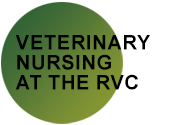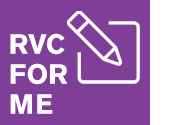Master of Research (MRes)
The Royal Veterinary College produces outstanding graduates who go on to work in some of the world’s leading scientific research institutes, as well as within industry and government. It is also one of the world's leading centres for postgraduate veterinary science study.
An RVC Master of Research (MRes) may be for you if you do not wish to commit to undertaking a PhD but want to try a sizeable research project and gain the generic skills applicable to research. You can do this over one-year full time, or over two years part-time while you are continuing your career.
The MRes is designed to equip you to acquire the experience and the skills needed to enter a PhD programme or to move on to careers where advanced research experience will help you. It is an excellent training opportunity for both biological and veterinary graduates and addresses both basic and clinical problems in the biosciences, with applications in veterinary and human medicine. Research areas span cell and molecular science, whole animal physiology and population medicine.
An RVC MRes will develop you as a scientist who is capable of working across interdisciplinary teams and who can tackle problems of practical relevance to veterinary and medical science. You will:
- Learn from experts who produce cutting-edge research in a range of subjects and are published in the top academic journals
- Join an international team of staff and students
- Benefit from close proximity to other international centres of excellence in biomedical and biological sciences.
 Veterinary Nursing at the RVC
Veterinary Nursing at the RVC
Find out more about what veterinary nursing at the RVC can offer you, your career and your team. Veterinary Nursing at the RVC
 Sign up to hear more from RVC
Sign up to hear more from RVC
If you’re interested in studying this course, and would like to stay informed, sign up to our RVC For Me mailing list to receive relevant information about upcoming events, students stories and life at the Royal Veterinary College.
Eligibility criteria can vary between MRes projects, so please review the individual project carefully. Our standard MRes entry criteria is detailed below:
Academic Qualifications
Applicants should normally have a first-class or second-class university honours degree in a biological science, veterinary, or medical degree. Applicants who do not hold a first-class or second-class honours degree but who do hold other relevant qualifications and/or experience will be considered on an individual basis in line with the RVC's APL and APEL requirements.
English Language Requirements
You must be able to communicate clearly in English, both verbally and in writing. Please review our English Language Proficiency pages to see if you need to provide evidence of your English language proficiency.
If you are not exempt from proving your English language proficiency, you must take an IELTS-Academic test (from the British Council). You need to achieve an overall score of 7.0 with a minimum of 6.5 in each sub-test, and the test result must have been obtained within 2 years of the start-date of the course.
EU Students
The UK Government has confirmed that EU/EEA and Swiss national students who have started an eligible course in the 2020/21 academic year or earlier academic years remain eligible to pay the “Home” rate of tuition fees and claim any financial support for which they are currently eligible for the duration of that course.
EU/EEA and Swiss national students starting studies in the 2021/22 academic year or later academic years may no longer be eligible to pay the “home” rate of tuition fees nor claim any financial support for their studies - but this depends on your personal circumstances (including immigration status and residence history in the UK). To help determine whether you would be eligible for home fees please see the UKCISA's 'Who pays 'home' fees for higher education in England?' guide found here.
Short-listing and interviews
MRes applications are checked for eligibility by Admissions once the deadline is reached. Applications are then sent to project supervisors for short-listing. Short-listed MRes applicants will be invited to an interview at either the Camden or Hawkshead campuses with the supervisory team (in some circumstances, interviews can be conducted remotely).
If you have any questions about eligibility please contact Admissions: admissions@rvc.ac.uk.
With more than 100 research-active staff at the RVC, the range of research topics is vast, extending from molecules to whole animals and animal populations. We focus on two main research themes:
- Comparative Physiology & Medicine - Our understanding of animal disease, together with the superb facilities at the RVC, means that we are all well paced to contribute to the way in which human diseases are diagnosed and treated. The programme is led by Professor Dominic Wells
- Livestock Production and Health - There is international recognition of the need for new approaches to meet the growing challenges of livestock production, to control infectious diseases that threaten humans and animals. The programme is led by Professor Dirk Werling
You will join the RVC to undertake a specific piece of work under the direction of two supervisors, working within one or more of the RVC’s research groups. We offer a range of specific MRes projects which you can apply for, or you may have your own area of research in mind. Most of our MRes students are self-funded, but funded MRes projects are occasionally advertised.
Your MRes will culminate in a research dissertation of 10,000-15,000 words and an oral presentation.
To underpin the research you are undertaking you will participate in training skills workshops, courses and seminars alongside other post-graduate researchers. You can find out more about our skills development programme here. You will be supported throughout your time with us by your supervisors, Programme Management and Academic Registry.
We have one MRes intake annually, at the beginning of October each year, and students undertake the course over one year fulltime or two years part-time (this option is only available for some projects).
For our October 2025 MRes intake we will be offering range of projects.
Applicants may be expected to contribute to the running costs of a project. The sums required will vary between projects and you are advised to contact the Graduate School or the supervisor of the project you are interested in for further information before making an application.
If you are interested in the project and would like to find out more about it please click on the project title.
If you would like to apply for the projects, please follow the steps outlined on the How to Apply pages.
Currently Available MRes Projects
Other Self-Funded MRes Projects
If you are interested in undertaking a self-funded MRes project you will need to begin by contacting a potential supervisor working in your field of interest so that you can draw up a MRes research project proposal together. You can find potential supervisors, by looking through our Research pages. We find applicants are often more successful when contacting supervisors directly.
You need to have an area of research in mind and your research project and supervisor should be agreed before you formally apply. Applicants will be expected to contribute to the running costs of a project. The sums required will vary between projects and you should discuss this with your supervisor.
Once you have agreed on a project and supervisor, please follow the steps outlined on the How To Apply pages.
A postgraduate degree from the RVC is highly regarded and recognised internationally.
Our graduates have a track record of successful careers in government, research and other organisations. Many students use the MRes as a way to gain valuable research experience and skills before going on to do a PhD.
Further information on the course can be found as follows:
MRes Award and Assessment Regulations
PGR Code of Practice and Student Leave Entitlements for PGR Students
Tuition Fees
The tuition fees are as follows:
|
Course
|
Year commencing course |
Home Tuition Fees including Island Fees (Channel Islands & Isle of Man) |
International Fees |
| MRes (FT) |
2024/25 |
£4,786 |
£30,670 |
| MRes (PT) | 2024/25 | £2,393 |
£15,340 |
| MRes (FT) | 2025/26 | £5.006 |
£32,970 |
| MRes (PT) | 2025/26 | £2,503 |
£16,490 |
In addition to tuition fees applicants may be expected to contribute to the running costs of a project. The sums required will vary between projects and you are advised to contact Admissions or the supervisor of the project you are interested in for further information before making an application.
We welcome applications from students in receipt of scholarships from their governments or other bodies or from self-funded students able to support their studies.
The UK Government has confirmed that EU/EEA and Swiss national students who have started an eligible course in the 2020/21 academic year or earlier academic years remain eligible to pay the “Home” rate of tuition fees and claim any financial support for which they are currently eligible for the duration of that course.
EU/EEA and Swiss national students starting studies in the 2021/22 academic year or later academic years may no longer be eligible to pay the “home” rate of tuition fees nor claim any financial support for their studies - but this depends on your personal circumstances (including immigration status and residence history in the UK).
International Students please see funding options for international students.
Tuition fee amounts are subject to increase each academic year, please be aware of this when making your calculations and planning how much money you will require.
